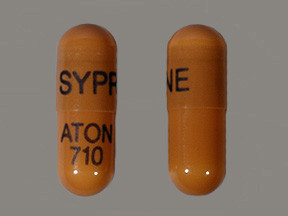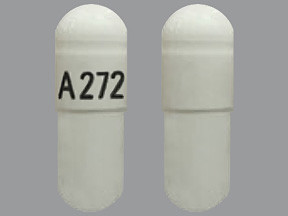TRIENTINE - ORAL
PHONETIC PRONUNCIATION: (TRYE-en-teen)
COMMON BRAND NAME(S): Syprine
GENERIC NAME(S): trientine HCl
Uses
USES: This medication is used to treat a certain inherited disorder (Wilson's disease). This disorder causes too much copper to build up in the liver, brain, and other parts of the body. Trientine works by binding to copper, which helps your body get rid of extra copper. This can decrease symptoms such as problems with speech/swallowing/coordination, tiredness, lack of appetite, abdominal pain, yellowing eyes/skin, fluid buildup in the legs/abdomen, uncontrolled movements, or muscle stiffness.
How to use TRIENTINE - ORAL
HOW TO USE: Take this medication by mouth on an empty stomach, at least 1 hour before meals or 2 hours after meals as directed by your doctor, usually 2 to 4 times daily. Take this medication at least 1 hour apart from any other drug, food, or milk. Swallow the capsules whole with water. Do not open or chew the capsules. The dosage is based on your medical condition and response to treatment. For the best effect, follow a low-copper diet as directed by your doctor and take this medication regularly. To help you remember, take it at the same times each day. For the first month of treatment, check your temperature every night and tell your doctor of any fever or rash. If your doctor directs you to also take an iron supplement, take it at least 2 hours before or after trientine. Tell your doctor if your condition does not get better or if it gets worse. If you accidentally come in contact with the capsule contents, wash the area promptly with water to avoid an allergic reaction.
Side Effects
Precautions
Interactions
Overdose
Images

- color
- light brown
- shape
- oblong
- imprint
- SYPRINE, ATON 710

- color
- light brown
- shape
- oblong
- imprint
- SYPRINE, ATON 710
Reviews
Faq for TRIENTINE - ORAL
Trientine is an oral medication that is primarily used to treat Wilson's disease, a genetic disorder that causes excess copper buildup in the body.
Trientine works by binding to copper in the body and preventing its buildup, thus helping to remove excess copper from the tissues.
Common side effects of trientine may include nausea, vomiting, stomach upset, diarrhea, loss of appetite, and changes in taste sensation.
Trientine is usually taken on an empty stomach at least one hour before or two hours after meals. It is typically taken two to four times a day as prescribed by a healthcare professional.
It is generally recommended to take trientine on an empty stomach, as food or milk may decrease its absorption and effectiveness. However, it is essential to follow the specific instructions provided by your doctor or pharmacist.
Trientine may interact with certain medications, such as antacids, iron supplements, and zinc supplements. It is important to inform your healthcare provider about all the medications, supplements, and herbal products you are taking before starting trientine.
The effectiveness of trientine may vary from person to person. It may take several months to see significant improvements in Wilson's disease symptoms and copper levels. Regular follow-up with a healthcare professional is important to monitor the treatment's progress.
The use of trientine during pregnancy or breastfeeding should be discussed with a healthcare professional. The potential benefits and risks need to be carefully evaluated, and alternative treatment options may be considered.
If you miss a dose of trientine, take it as soon as you remember. However, if it is close to the time for the next scheduled dose, skip the missed dose and continue with the regular dosing schedule. Do not take double doses to make up for missed ones.
Trientine is an oral medication used to treat Wilson's disease, a rare genetic disorder that causes copper to accumulate in the liver, brain, and other organs.
It may take several months of treatment with trientine to see the full benefits. Close monitoring of copper levels in the blood and urine is necessary during this time.
Yes, trientine can interact with some medications, such as antacids, iron supplements, and certain antibiotics. It is important to inform your doctor about all the medications you are taking before starting trientine.
The safety of trientine during pregnancy and breastfeeding is not well-established. It is important to discuss with your healthcare provider if you are pregnant or planning to become pregnant, or if you are breastfeeding.
Yes, trientine is a prescription medication and can only be obtained with a valid prescription from a healthcare professional.
While trientine cannot cure Wilson's disease, it is an effective long-term treatment that helps control copper levels in the body. Continuous use of trientine is necessary to manage the symptoms of the disease.
Disclaimer
IMPORTANT: HOW TO USE THIS INFORMATION: This is a summary and does NOT have all possible information about this product. This information does not assure that this product is safe, effective, or appropriate for you. This information is not individual medical advice and does not substitute for the advice of your health care professional. Always ask your health care professional for complete information about this product and your specific health needs.

No Reviews Yet